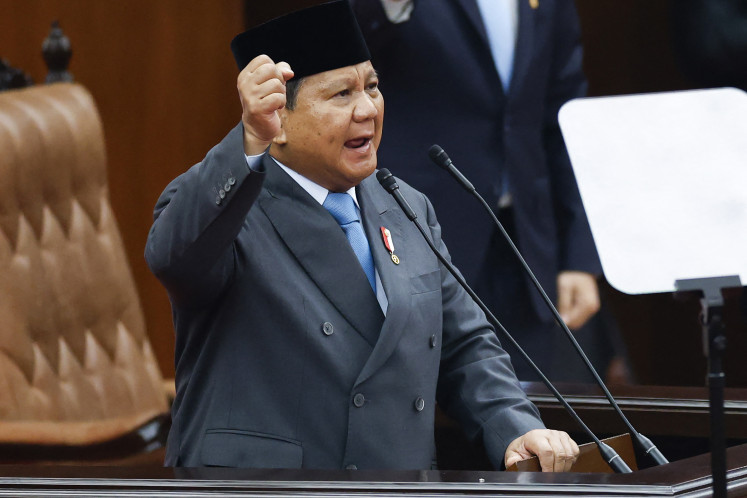Popular Reads
Top Results
Can't find what you're looking for?
View all search resultsPopular Reads
Top Results
Can't find what you're looking for?
View all search resultsGovt’s capital spending grows faster in first three months
The growth rate of the disbursement of the government’s capital expenditure doubled in the first three months this year from in the same period last year, Finance Minister Agus Martowardojo says
Change text size
Gift Premium Articles
to Anyone
T
he growth rate of the disbursement of the government’s capital expenditure doubled in the first three months this year from in the same period last year, Finance Minister Agus Martowardojo says.
“From January to March last year, capital spending was between 3 and 4 percent [of the allocated amount in the state budget], while as of the end of March this year, capital spending was between 7 and 8 percent,” Agus told reporters in Jakarta on Friday.
“This has been a good start in the disbursement of our capital expenditure from the state budget,” he added. Agus also said that overall, the government had managed to slightly improve total budget disbursement in the first three months of 2012.
“As of the end of March 2012, total budget disbursement stood at 17 percent, better than the figure recorded last year, which was 16 percent,” he said.
Agus forecast that capital spending utilization would need some adjustment over the next couple of months due to the recent revision of the 2012 state budget, which was approved by the House of Representatives recently.
“During the deliberation of the budget revision at the House, capital spending in several ministerial offices and state institutions was halted. We also need to adjust a number of points in the budget implementation list [DIPA] in each ministry and other government institutions in the future because the revised state budget stipulates a number of cuts worth Rp 18.9 trillion,” he said.
“So, all ministries and state institutions must start revising their DIPA starting now so that their programs can be realized as soon as possible. I hope that our monitoring and evaluation teams will maintain their consistency to ensure all ministries and state institutions utilize their DIPA in the most proper manner,” he added.
To help accelerate capital expenditure in ministries and state institutions, Agus urged for a revision of Presidential Regulation (Perpres) No. 54/2010 on public goods and services procurement to be finalized and to be implemented as soon as possible.
“The implementation of the Perpres revision will help us to accelerate budget realization,” he said.
One of the clauses in the regulation concerns Clause No. 39, which currently stipulates that direct procurement (without tender) could only be conducted on goods and services that are worth Rp 100 million (US$11,000) or less.
Under the revision, direct procurement can be conducted on goods and services worth Rp 200 million or less.
The government would revise its simple auction mechanism, also known as the selection method, in the revision.
Previously, a simple auction could only be conducted on goods and services worth Rp 200 million at the most. Under the revision, the government would raise the maximum limit of the simple auction value to Rp 5 billion.
Government spending plays a major role in the Indonesian economy, which relies heavily on domestic consumption.
President Susilo Bambang Yu-dhoyono previously lamented in December 2011 that Indonesia had missed opportunities to grow at a faster pace partly due to the poor disbursement of state budget spending especially related to capital expenditures, which was widely used to build infrastructure development.
The government allocated Rp 186.55 trillion for capital expenditures in the 2012 revised state budget, up from Rp 142.82 trillion in the 2011 revised state budget.
Yudhoyono did not hide his disappointment over a Finance Ministry report that showed that as of Nov. 30, the government had only spent 71 percent of the total allocated budget for 2011.
A government-sanctioned think-tank, the National Economic Committee (KEN), warned that the failure to disburse every Rp 100 trillion of state funds meant the economy had lost the opportunity to grow by an additional 0.7 percent by the year’s end.
Critics have also pointed out that for years government institutions have had the tendency to accelerate their spending during the end of the year.
The Finance Ministry’s fiscal policy acting head Bambang Brodjonegoro said that the government would do its best to improve spending rates, particularly on capital spending, for the sake of economic growth.
“We know that the global economic growth is weakening. So, we have to counter this condition while improving consumption and investments. Capital spending is essential to strengthen our investments,” he said.










